
Toxicon-X
metrics 2024
Championing Open Access in Toxicological Research
Introduction
Toxicon-X is a prestigious journal published by ELSEVIER, specializing in the dynamic field of toxicology. With an impact factor indicative of its excellence and rigor—ranked Q1 in Toxicology as of 2023, and positioned at #40 out of 133 in Scopus's Pharmacology, Toxicology, and Pharmaceutics category—this journal is a vital resource for researchers, practitioners, and students alike. Since its inception in 2019, Toxicon-X has embraced an Open Access model, enhancing accessibility and transparency of research findings. This ensures that crucial studies on toxic agents and their effects reach a broader audience, driving advancements in public health and safety. The journal is based in the United Kingdom and caters to a diverse international readership, with its scope encompassing novel research, reviews, and insights into emerging toxicological challenges. As we move towards the 2024 convergence year, Toxicon-X remains committed to fostering a deeper understanding of toxic substances, their mechanisms, and implications for human and environmental health.
Metrics 2024
 0.87
0.87 3.60
3.60 3.10
3.10 16
16Metrics History
Rank 2024
Scopus
IF (Web Of Science)
JCI (Web Of Science)
Quartile History
Similar Journals
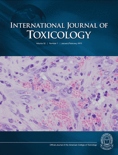
INTERNATIONAL JOURNAL OF TOXICOLOGY
Championing Open Access in Toxicology for Global Impact.The International Journal of Toxicology, published by SAGE Publications Inc, serves as a cornerstone of scholarly research in the field of toxicology, with an established history dating back to 1982. This esteemed journal, ISSN 1091-5818 and E-ISSN 1092-874X, functions within the Q3 quartile in Toxicology, ranking 94 out of 133 in the Pharmacology, Toxicology and Pharmaceutics category per Scopus metrics, reflecting its commitment to advancing scientific understanding in this critical area. The journal not only aims to disseminate high-quality research but also encourages open access to vital studies, thus fostering collaboration and innovation among researchers, professionals, and students alike. With a focus on various aspects of toxicology, including but not limited to environmental, clinical, and molecular toxicology, the International Journal of Toxicology is dedicated to bridging gaps in toxicity research and promoting safe practices across numerous disciplines. As it converges towards 2024, the journal continues to play a vital role in shaping the discourse surrounding the implications of exposure to toxic substances in human health and the environment.

Frontiers in Toxicology
Advancing the Science of ToxicologyFrontiers in Toxicology, published by Frontiers Media SA, is a prominent open-access journal dedicated to advancing the understanding of toxicological science. Established in 2019, it serves as a vital forum for innovative research, offering insights into the pharmacological impacts and toxicological profiles of various substances. With its international reach based in Switzerland, this journal has quickly ascended in the academic community, achieving a notable Q1 ranking in Pharmacology, Toxicology and Pharmaceutics (Miscellaneous) and a Q2 ranking in Toxicology as of 2023. The journal is indexed in Scopus, where it ranks #8 out of 43 in its primary category, underscoring its influence and relevance in the field. The scope encompasses cutting-edge studies on the mechanisms of toxicity, including both human and environmental impacts, making it an essential resource for researchers, professionals, and students alike. By promoting open access to high-quality research, Frontiers in Toxicology plays a crucial role in enhancing knowledge sharing and fostering collaboration across disciplines.

Molecular & Cellular Toxicology
Fostering interdisciplinary collaboration for toxicological breakthroughs.Molecular & Cellular Toxicology, published by the Korean Society Toxicogenomics & Toxicoproteomics (KSTT), is a significant journal in the field of toxicology, providing crucial insights into molecular mechanisms underlying toxic responses. With an ISSN of 1738-642X and E-ISSN 2092-8467, this journal serves as a vital platform for researchers, professionals, and students interested in the latest findings and advancements in toxicology, health, and environmental science. Although it operates under a subscription model, it maintains rigorous peer review standards, contributing to its respectable Q3 classification in Health, Toxicology and Mutagenesis, and its Q2 standing in Pharmacology, Toxicology, and Pharmaceutics. The journal, intersecting with innovative aspects of pharmacology and public health, aims to foster a deeper understanding of toxicological impacts on cellular processes and overall health. Located in Germany and supported by a dedicated editorial board, Molecular & Cellular Toxicology stands out in the academic community, encouraging interdisciplinary discourse and collaboration to address critical toxicological challenges. Engage with us for cutting-edge research that informs and shapes the future of toxicological science.

NEUROTOXICITY RESEARCH
Charting New Frontiers in Neurotoxic ResearchNEUROTOXICITY RESEARCH is a premier journal published by SPRINGER, focusing on the critical and evolving field of neurotoxicology. With an ISSN of 1029-8428 and an E-ISSN of 1476-3524, this journal serves as a vital platform for researchers, professionals, and students dedicated to understanding the impact of toxic substances on nervous system health. Established in 1999, NEUROTOXICITY RESEARCH has consistently contributed significant findings and discussions that influence both theoretical and applied neuroscience. The journal's impressive Q2 ranking in both Neuroscience (miscellaneous) and Toxicology categories, alongside its strong percentile rankings in Scopus, underscores its relevance and quality in the academic community. While this journal is not open access, it remains a critical resource for those seeking interdisciplinary insights into the mechanisms of neurotoxicity. The objective of NEUROTOXICITY RESEARCH is to elucidate the intricate interactions between environmental and chemical agents and their neurotoxic effects, guiding future research and policies aimed at safeguarding neurological health. Based in the United States at ONE NEW YORK PLAZA, SUITE 4600, NEW YORK, NY 10004, this journal is committed to advancing the understanding of neurotoxic mechanisms and fostering collaborative efforts within the scientific community.
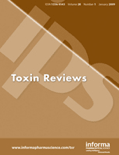
Toxin Reviews
Advancing the Science of ToxicologyToxin Reviews is a premier academic journal focused on the critical field of Toxicology, published by Taylor & Francis Inc. Established with an aim to foster research and disseminate knowledge, this journal has been pivotal since its inception in 1982 and continues to be a leading platform for both emerging and established researchers. With an impressive impact factor and ranked in the 75th percentile among its peers in the Scopus categories, it serves as an essential resource for scientists, practitioners, and students interested in understanding the complexities of toxins and their effects on health. The journal provides an Open Access platform, enhancing visibility and accessibility of research findings to a broader audience. Covering a wide scope, Toxin Reviews plays a vital role in bridging gaps between toxicological research and practical applications, ensuring that rigorous scientific inquiry translates into real-world solutions.
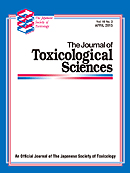
JOURNAL OF TOXICOLOGICAL SCIENCES
Exploring the Complexities of Toxic SubstancesThe Journal of Toxicological Sciences, published by the Japanese Society of Toxicological Sciences, is a prominent academic journal dedicated to the comprehensive study of toxicology and its related fields. Since its inception in 1976, the journal has provided a vital platform for researchers and professionals to disseminate innovative findings and insights in toxicology, with a focus on both experimental and clinical studies. Positioned in the Q3 quartile across various relevant categories, including Medicine (miscellaneous) and Toxicology as of 2023, the journal plays an essential role in advancing our understanding of toxic substances and their effects on biological systems. Although currently not open access, the journal maintains high academic standards and is indexed in Scopus, ranking #96 in Toxicology. Offering unique perspectives from Japan, it encourages global collaboration and discourse among toxicologists, making it an invaluable resource for students, researchers, and industry professionals alike.
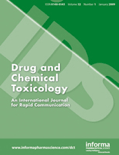
DRUG AND CHEMICAL TOXICOLOGY
Bridging disciplines for safer environments.Drug and Chemical Toxicology is a well-respected journal in the fields of toxicology, pharmacology, and public health, published by Taylor & Francis Ltd. Since its inception in 1978, this journal has diligently explored the effects and mechanisms of chemical exposures on health and the environment, fulfilling a crucial role in advancing scientific understanding and safeguarding public health. The journal is indexed across prestigious databases and features an impressive array of articles categorized within the Q2 and Q3 quartiles across various categories in 2023, reflecting its significance in Chemical Health and Safety as well as Environmental and Occupational Health disciplines. With an extensive reach and a focus on interdisciplinary research, Drug and Chemical Toxicology offers a rich repository of original research, reviews, and methodological advancements, catering to a diverse audience of researchers, professionals, and students dedicated to the betterment of safety and health standards. Although not an open-access publication, its articles are widely accessible to the academic community, ensuring that critical innovations and insights are shared for the greater good.

Journal of Immunotoxicology
Advancing the Frontiers of ImmunotoxicologyJournal of Immunotoxicology, published by Taylor & Francis Ltd, is at the forefront of research in the intersecting fields of immunology and toxicology. With an annual impact factor that reflects its growing influence, this Open Access journal has been essential for disseminating valuable knowledge since its inception in 2004. The journal welcomes novel research articles, reviews, and commentary that explore the effects of xenobiotics on the immune system, contributing to a deeper understanding of immunotoxicological mechanisms and implications for human health. As a recognized platform, it has achieved commendable rankings in Scopus, positioning it within Q3 in Immunology and Q2 in Toxicology categories as of 2023. This ensures that the journal remains a critical resource for researchers, professionals, and students seeking to advance their knowledge and contribute to the evolving landscape of immunotoxicology. With an Open Access model since 2017, it maximizes accessibility and reaches a global audience, supporting the collaborative efforts needed to address contemporary challenges in health and safety.
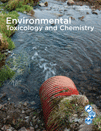
ENVIRONMENTAL TOXICOLOGY AND CHEMISTRY
Illuminating the pathways of toxins in our world.ENVIRONMENTAL TOXICOLOGY AND CHEMISTRY is a premier journal published by Wiley that has established itself as an essential resource for researchers, professionals, and students in the fields of environmental chemistry and toxicology. With a robust trajectory since its inception in 1982, the journal offers critical insights into the interactions between environmental pollutants and biological systems, aiming to advance our understanding of the impacts of toxins on health and ecosystems. Recognized in the top quartile (Q1) of both Environmental Chemistry and Health, Toxicology, and Mutagenesis categories as of 2023, the journal is respected for its rigorous peer-reviewed content and high impact factor. It ranks 33rd out of 148 in Health, Toxicology and Mutagenesis and 48th out of 147 in Environmental Chemistry according to Scopus metrics, placing it firmly within the most influential publications in these fields. Although it does not currently offer open access, the journal remains a vital conduit for disseminating cutting-edge research and innovative methodologies that address pressing environmental challenges.
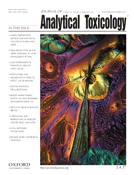
JOURNAL OF ANALYTICAL TOXICOLOGY
Elevating Standards in Chemical Health and SafetyJOURNAL OF ANALYTICAL TOXICOLOGY, published by Oxford University Press Inc, stands as a leading platform in the field of analytical chemistry and toxicology, focusing on the rigorous exploration of methodologies and advancements in the detection of toxic substances. Since its inception in 1977, this journal has continually contributed to the scientific community, providing researchers and professionals with vital insights into chemical health, safety, and environmental implications. With an impressive Q1 ranking in both Analytical Chemistry and Chemical Health and Safety, along with reputable Q2 rankings in Environmental Chemistry and Toxicology, the journal maintains its critical standing in vibrant academic communities, ensuring the dissemination of high-quality research. Although it currently does not offer open access, articles are made available via institutional subscriptions, allowing widespread access to its valuable findings. Located in the United States, the journal contains a wealth of knowledge poised to benefit scientists and scholars engaged in toxicological research, emphasizing its importance in enhancing public health and safety.